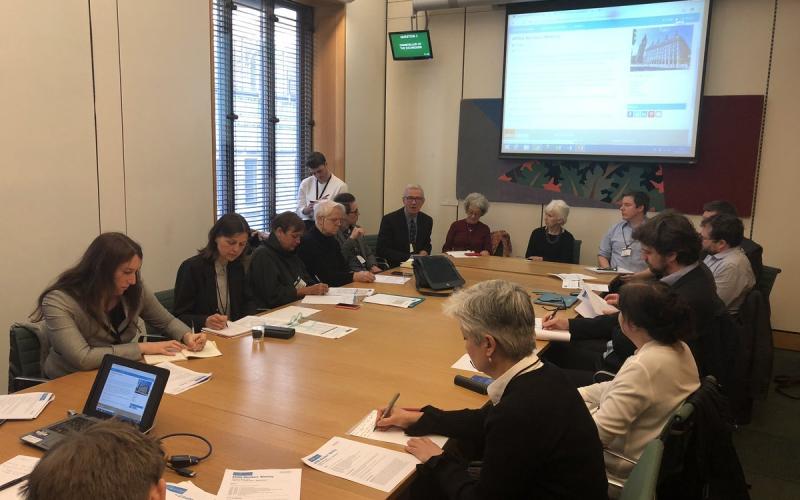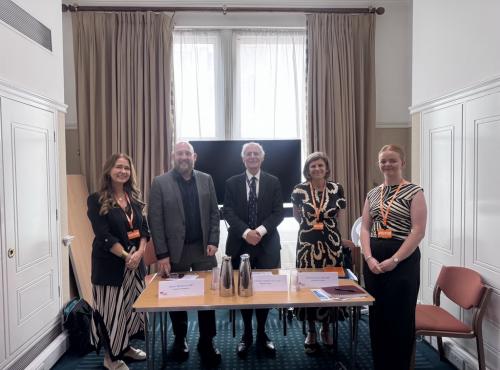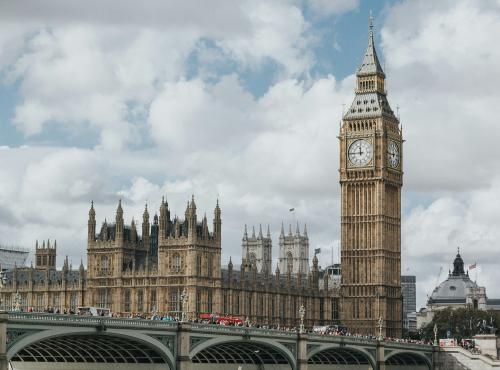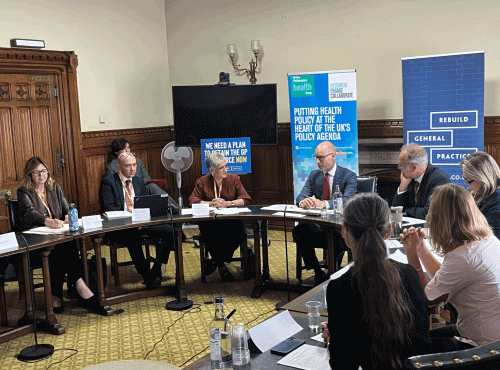APDIG members discuss plans for 2019
The All-Party Parliamentary Design and Innovation Group was delighted to host an all-members meeting in Parliament on Tuesday 5th March. Those in attendance heard an update on APDIG's plans for 2019, an overview of the current political situation, as well as having a general discussion on the major issues affecting the design sector.
The meeting was chaired by Julia Bennett, Head of Research and Development at the Crafts Council, and brought together over twenty APDIG members, as well as representatives from organisations such as the British Council. APDIG Co-Chair, Barry Sheerman MP, also attended to speak about how Parliament was engaging with matters affecting the design sector.
APDIG Manager, Jack Tindale, gave an update on the Group's policy work on Brexit, the skills pipeline, and the relevance of design to the wider economy and to addressing the challenges posed by automation and the 4th Industrial Revolution. Members also agreed with the importance of engaging more with the Further Education sector. The APDIG is exploring options for way in which to do so in association with the APPG for Skills and Employment.
The members also heard about upcoming events by the Group, including:
Designing for Play – Monday 18th March, 2019
The 4th Industrial Revolution is already proving that creativity and design-thinking will be at the heart of the 21st Century economy, with such skills to ensuring that the workers of tomorrow are able to meet the challenges of the future.
However, this comes at a time when many schools are unable to provide the environment to allow young people to learn through play, with art, design and creative subjects no longer core subjects within the English Baccalaureate. In addition, twenty percent of all children say they are too busy to play, despite the vital role that this has in personal development. Play also helps young people to make friends, solve problems, and develop critical thinking skills.
The APDIG will be hosting this workshop in association with the Museum of Childhood and the APPG for Assistive Technology (APGAT). Together, all three organisations will work with numerous stakeholders to promote the outcomes from the roundtable and to ensure that a wide level of representation from across the design and innovation sectors, as well as to improve engagement for individuals with physical and neurological disabilities and special education needs.
The workshop will focus on three core themes:
- Innovation in design for play
- Early years and play (PEDAL)
- Play deprivation/play and poverty
The format of the event will consist of brief presentations on the areas above, followed by an informal workshop format to discuss major issues and priorities to improve policy making in these sectors. The event will be chaired by Rushanara Ali MP, Labour Member of Parliament for Bethnal Green and Bow.
The workshop will concluding with a networking lunch, as well as an opportunity for attendees to visit the Museum’s collections, including the temporary exhibition, A Pirate’s Life for Me.
Craft, Design and Exporting – Tuesday 14th May 2019
In collaboration with the Crafts Council, this panel discussion will consider core questions/themes on how to protect and promote design and craft exports/
The event will bring together key stakeholders and will feed into a brief term paper detailing the main issues raised, as well as key policy recommendations for the future.
Additionally, event will also provide an opportunity to showcase the Crafts Council’s new exporting toolkit, as well as the Council’s Craft In Industry cards, highlighting examples of best practice in product design and suggestions for how policy makers can improve the scope and potential of the craft sector, such as:
- The current position of craft within DCMS export sectors
- Challenges and opportunities presented by Brexit
- How the modern industrial strategy can encourage craft business development
- The role of craft as a part of the GREAT campaign
- Examples of best practice from other countries
This will be shared with leading Parliamentarians and Government figures, with a particular focus on HM Treasury, the Department for Business, Energy and Industrial Strategy, and the Department for Culture, Media and Sport. Leading industry press and media outlets will also be invited, such as Design Week, Dezeen and relevant figures from the national media.
Visual Arts and Soft Power (April – September 2019)
This research paper will intends to highlight the inherent strength of the UK’s visual arts sector. The UK is well-regarded internationally with a strong reputation for critically-engaged excellence and London hosts one of the three largest arts market hubs in the world. However, the disruption posed by Brexit, as well as the impact the UK’s withdrawal from the European Union, is already having an impact on the British economy and international influence. This project intends to identify the likely impacts of Brexit on the visual arts sector, as well as the resilience of the sector’s institutions, networks, and individual artists?
This consultation has two objectives:
- To inform policymakers of the issues facing the visuals art in light of Brexit
- To brief the visual arts on the implications and challenges posed by the UK’s withdrawal from the European Union
This project will consist of two to three roundtables around the United Kingdom that will consider the objectives. The matters raised will feed into a brief report highlighting key recommendation to Government. The report will be launch in Parliament in Autumn 2019.
The project will be held in partnership between the Contemporary Visual Arts Network (CVAN).
Members also heard from three members on current and ongoing projects:
Design Action Plan is an AHRC funded research project led by Manchester School of Art, Manchester Metropolitan University and PDR, Cardiff Metropolitan University in partnership with the Design Council. The aims of the project is to develop an action plan optimising the strategic use of design in the public and private sectors in the UK for maximum societal and economic benefit. Research demonstrates that design has a huge role to play in driving innovation that results in societal and economic benefit (Design Council, 2018; Innovate UK, 2016). This benefit is currently not being maximised in the UK as we do not have a consolidated, national action plan for design that integrates key stakeholder agendas (e.g. Design Council, BEIS, AHRC, NESTA, Innovate UK, KTN, etc.) and generates new insights that results in an evidence-based, high-level resource which compels decision-makers to enhance and increase the strategic use design as a driver of innovation. An action plan is critical as it provides users of design with a heightened, high-level understanding of what routes to innovation design can offer organisations and how design can be operationalized to maximise societal (enhanced wellbeing, increased social cohesion, improved human experiences) and economic (innovative products, improved services, efficiency gains) benefit. The integration of the what (demonstrating) and the how (implementing) sets this research apart from previous studies as it connects strategic vision with operational stepping stones of how design can create societal and economic benefit and as a result enhance the competitiveness of, and wellbeing in, the UK. The research challenge therefore is to develop a comprehensive action plan in such a way that it combines an evidence based high-level resource that compels decision-makers (in both the public and private sectors) to increase and enhance the strategic use of design as a driver for innovation and provides a roadmap to how that could be achieved.
ProxyAddress uses empty addresses to connect those facing homelessness with the support they need. An address is no longer just a location - it's now a de facto means of identification. This means that if a person becomes homeless they are immediately cut off from the basic services they need to recover. Benefits, a bank account, employment, a driving license - all are taken away at the point they are needed most. Those who might have otherwise got back on their feet with a little early support are instead left to become entrenched in the situation and, ultimately, develop more complex and care-intensive needs over time. ProxyAddress provides stable addresses throughout this period of instability. It uses existing records of empty properties to create a 'proxy' address - one which can be used to access services and provide identification regardless of location.
The V&A Research Institute (VARI) is a five-year programme of projects and partnerships supported by the Andrew W. Mellon Foundation. It takes the V&A's pioneering research culture into a new phase that allows the Museum to experiment with new ways of studying, displaying and accessibly storing its collections. VARI will give better access to the V&A's objects and join its experts with academic scholars, practicing designers and makers and members of the general public. Launched in 2016, VARI will create an innovative arena for developing collaborative research that is both collections-based and object focused. By making the collections we house and the expertise we host more visible, VARI will produce not just new knowledge but also new methods. Integrating research with teaching and learning, VARI will inform the Museum's major projects at its original location in London's South Kensington neighbourhood and at new locations around the country and across the globe.
Copies of all of these presentations will be made available shortly.
For more details of the plans above, and to hear more about the work of the APDIG - please contact jack.tindale [at] policyconnect.org.uk (subject: APDIG%20Members%27%20Meeting%20-%20March%202019) (Jack Tindale).




